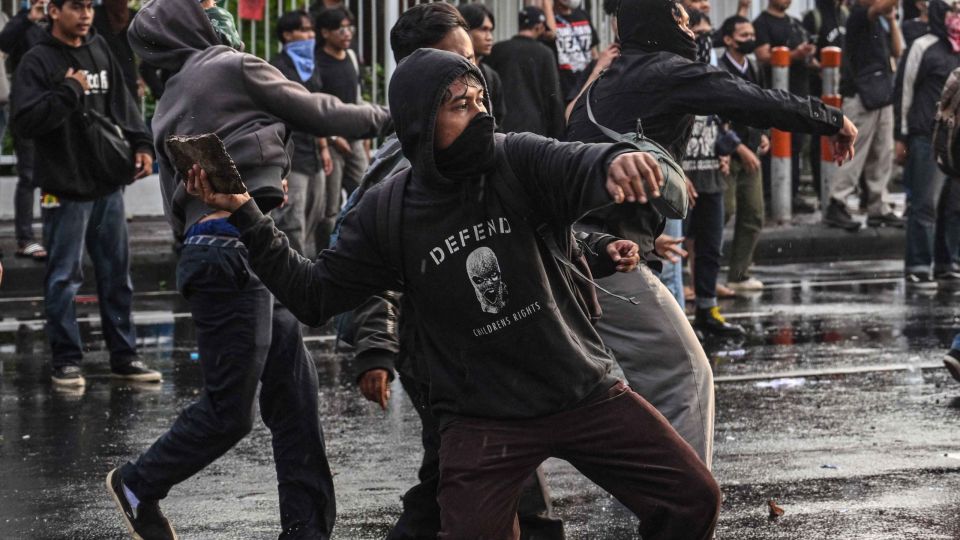March 26, 2025
JAKARTA – House of Representatives lawmakers have pledged to involve the public “meaningfully” in the deliberation of future bills, including a proposed revision to the 2002 Police Law, amid mounting public anger over a recent hasty, closed-door revision of the Indonesian Military (TNI) Law.
Protests have broken out in major cities such as Bandung and Surabaya since the House passed the TNI Law revision on Thursday following what critics called a rushed, opaque deliberation process.
The bill was passed about a month after President Prabowo Subianto requested that the legislature discuss a revision to the law. The legislative process included a closed-door meeting of lawmakers in a luxury Jakarta hotel, which was disrupted by human rights activists calling on the meeting’s participants to stop the revision.
Following the bill’s passage into law, concerns have been growing that the House may take the same approach in its revision of the Police Law.
National Mandate Party (PAN) lawmaker Sarifuddin Sudding asked the public not to worry, claiming the House had committed to ensuring openness and transparency in the legislative process.
“We’ll no longer hold closed-door meetings. Commission III will invite everyone, from experts to non-governmental organizations, to hear their insights,” he continued.
Superbody threat
Last year, the House kicked off a plan to revise the laws governing the National Police and TNI following a green light from the administration of former president Joko “Jokowi” Widodo.
But lawmakers decided to cancel the deliberations amid widespread public opposition. They did not give specific reasons for the cancellation, only saying that the work would be continued by the next batch of lawmakers.
Some observers at the time called for a revision of the prevailing Police Law to pave the way for much-needed reform within the force. However, the draft of the bill that circulated last year drew criticism for possibly giving greater authority to the police without strengthening oversight.
A copy of the bill that circulated on social media last year contains a provision that would give the police the power to “block and cut off access to cyberspace” in matters of “national security” or to prevent cybercrimes.
Other changes in the draft would give the police the authority to wiretap and secretly intercept communication devices. The corps could also launch intelligence operations, including by surveilling foreigners visiting the country, to prevent and mitigate activities threatening “national security”.
Should the proposed draft be passed into law, it may entrench police impunity and a politicization of law enforcement that would undermine democratic principles, according to public policy research group the Center for Law and Policy Studies (PSHK).
“Instead of reforming the institution for greater professionalism and accountability, the bill potentially turns the police into a powerful, unchecked entity with expanded surveillance and intelligence capabilities,” the group wrote in a statement in June 2024.
“Without significant changes, the legislation could roll back democratic progress and civil liberties in Indonesia.”
Wider protests
Speculation surfaced recently that the House would kick off formal deliberations of the Police Law, after reports that Prabowo had signed a presidential letter dated Feb. 13 that assigned several ministers to discuss the bill with lawmakers.
But House Speaker Puan Maharani of the Indonesian Democratic Party of Struggle (PDI-P) said on Tuesday that the legislature had neither received the letter nor opened any formal discussions on revisions to the Police Law.
“Any documents that have been circulating in public are not an official presidential letter,” Puan said.
The bill is not included in this year’s National Legislation Program (Prolegnas) priority list.
Despite Puan’s comments, critics have continued to sound the alarm over the possible revision on social media. On X, the hashtag #TolakRUUPolri (Reject the Police Bill) has been trending over the past few days and has been shared millions of times.
The online movement comes amid days of street protests in multiple cities in which hundreds of students and pro-democracy activists demanded the repeal of the recently passed TNI Law revision, which has expanded the role of the military in civilian affairs.
Observers have warned that “wider and larger protests” may come if the government and lawmakers continue to rush through legislation with minimal public participation.
“If the government refuses to learn from past political events and continues to govern carelessly and arbitrarily, these protests will only grow stronger,” said Nicky Fahrizal of the Jakarta-based Centre for Strategic and International Studies (CSIS).


